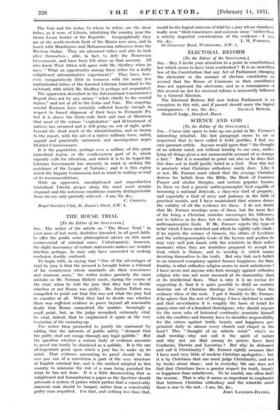THE ROUSE TRIAL [To the Editor of the SPECTATOR.]
SIR,—The writer of the article on " The Rouse Trial," in your issue of last week, doubtless intended, in all good faith, to offer the public some philosophical advice on this most controversial of criminal cases. Unfortunately, however, the slight inaccuracy of certain statements makes one wonder whether, perhaps, he may only have succeeded in making confusion doubly confused.
To begin with, in saying that " One of the advantages of trial by jury is that the accused is brought before a tribunal of his countrymen whose standards are their consciences and common sense," the writer makes precisely the same mistake as Mr. Norman Birkett made, during the course of
the trial, when he told the jury that they had to decide whether or not Rouse was guilty. Mr. Justice Talbot was compelled to point out that this was not what the jury had to consider at all. What they had to decide was whether there was sufficient evidence to prove beyond all reasonable doubt that Rouse committed the murder. Seemingly a small point, but, as the judge remarked, extremely vital. So vital, indeed, that he emphasized it again at the very beginning of his summing-up.
The writer then proceeded to justify his statement by adding that the interests of public safety " demand that the guilty shall not escape through any legal quibble." But the question whether a certain body of evidence amounts to proof can hardly be dismissed as a quibble. It is the one all-important point upon which a jury has to make up its mind. That evidence amounting to proof should be the sine qua non of a conviction is part of the very structure of English criminal law, and is the method adopted in this country to minimize the risk of a man being punished for what he has not done. It is a little disconcerting that so enlightened and humanitarian a paper as the Spectator should advocate a system of justice which prefers that a conceivably innocent man should be hanged, rather than a conceivably guilty man acquitted. For that, and nothing less than that,
would be the logical outcome of trial by a jury whose standards really were "their consciences and common sense "rather than a strictly impartial consideration of the evidence.—I am,















































 Previous page
Previous page